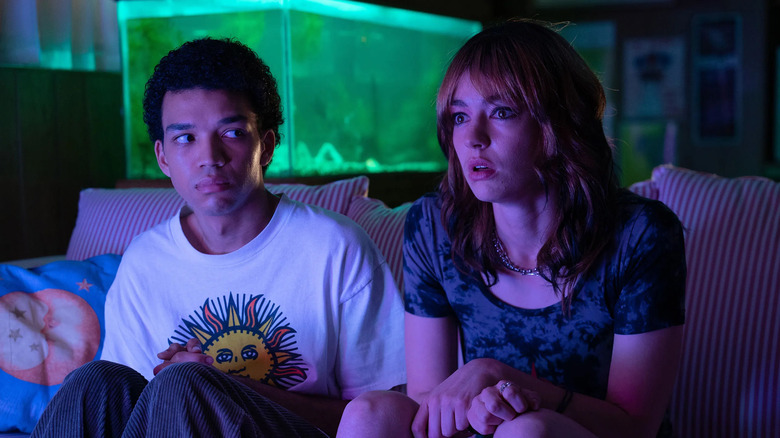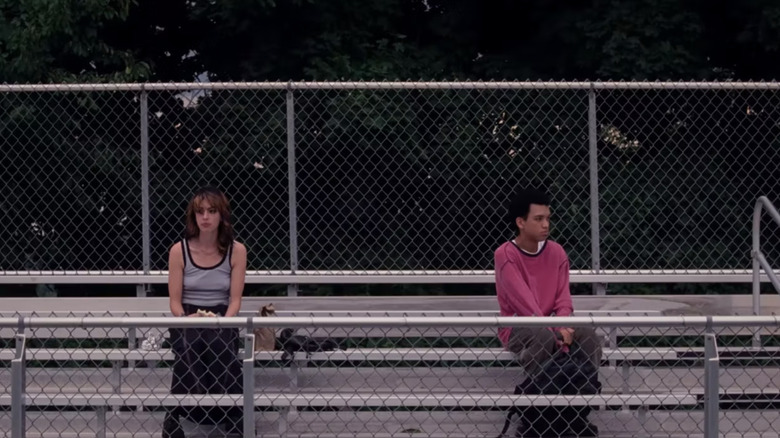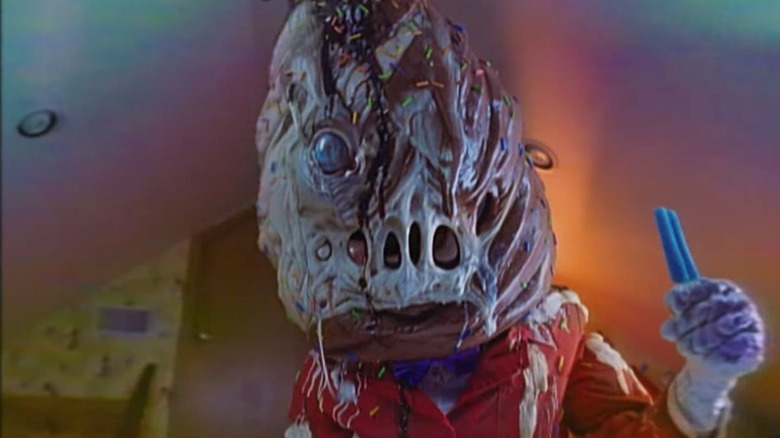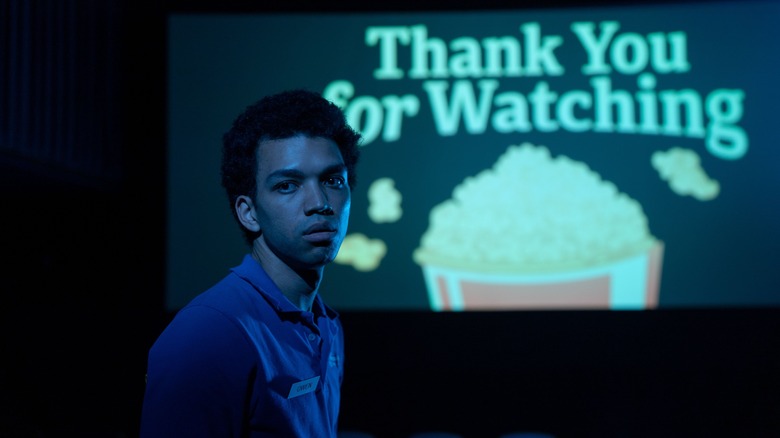I Saw The TV Glow Review: When The Monster Of The Week Is Your Own Mind [Overlook 2024]
When I was 9 years old, I was obsessed with the Disney Channel monster-of-the-week series, "So Weird." The show centered on a strong-willed teenage girl named Fiona "Fi" Phillips (Cara DeLizia) who used the power of information gathered from online research to help make sense of ghosts, monsters, folk legends, and other supernatural occurrences that seemed to follow her and her rockstar mom while they traveled the country on her comeback tour.
I wasn't yet a teenager and I certainly didn't own a laptop, but I could feel deep in my bones that I was just like Fi Phillips, and often fantasized what it would be like to live her life. Sometimes, the wind would blow a little too strong as I walked home from school or I'd hear a disembodied voice that was probably the result of my own imagination, and the line between my favorite TV show and my own life would blur. Sometimes I think back on my own inexplicable childhood experiences and have to actively clock whether something really happened, or if this memory blended with something I had watched on TV.
Film and television are often used as stand-in language for the emotions we feel but cannot process, or in many cases — the things we know deep down but are too afraid to say out loud. Jane Schoenbrun's sophomore feature "I Saw The TV Glow" is an examination of this very feeling, soaked with the neon flush of radical '90s young adult television, where the monsters are too scary and the lore is too complex for children to understand or appreciate, but everyone still writes off the subgenre as "kid's stuff." The lines between reality and television-absorbed memories aren't just blurred but swirled together like an ethereal ice cream cone twist on a sunny day in the suburbs.
Allowing TV to talk for you
"I Saw the TV Glow" centers on Owen (Justice Smith), who we follow from 7th grade (played during that year by Ian Foreman) until somewhere into adulthood. Owen is a curious but isolated kid, treating his mother (Danielle Deadwyler ) as a safety blanket and avoiding his father (Fred Durst, yes that Fred Durst) if at all possible. Owen doesn't really have friends, but is fascinated with a monster-of-the-week TV show called "The Pink Opaque" that he's not allowed to watch because it plays after his bedtime, and because his dad says it's a show "for girls." The series is an avatar for beloved shows like "Buffy the Vampire Slayer" and "Eerie, Indiana," and there are multiple recreations of episodes scattered throughout. Owen meets a classmate a few years ahead named Maddy (Brigette Lundy-Paine), who is fully "Pink Opaque"-pilled and treats the series as an extension of identity.
Their friendship is intrinsically linked in this show, with Maddy leaving Owen VHS tapes of episodes after they air so he can see them, and Owen lying to his parents about sleeping over at a friend's house and instead sneaking over to Maddy's from time to time to watch the show when it airs. There's a deeper connection that they share that cannot be explained in words, allowing "The Pink Opaque" to do all the talking. In the few moments they have where they genuinely try to communicate with each other, Owen doesn't have the words to explain how or why he feels the way he does. His anxiety is his own existence, with the truth of what that means desperately trying to come through static signals, like the brief moments of an illegal channel flashing between the tracking bars of stolen cable. And then Maddy disappears, with the only trace left behind a burning television and the cancellation of "The Pink Opaque."
Mr. Melancholy and the infinite sadness
Like Schoenbrun's debut feature "We're All Going to the World's Fair," the visual storytelling of "I Saw The TV Glow" is haunting, cerebral, and eerily taps into the life-altering confusion that comes with coming-of-age. Because the lines between reality and "The Pink Opaque" are constantly chasing one another, the film utilizes the same overwrought narration often shown in these shows, with Owen directly addressing the camera or Maddy launching into long-winded monologues. It works if you're familiar with the form, but it might be distracting to those on the outside. The big bad of "The Pink Opaque" is the painfully obvious named "Mr. Melancholy," and yet this is the greatest work of writing either of them has ever known. There's a sweet messiness to not just Owen and Maddy's interpretations of the show, but also themselves. They are both at times under the impression that they're operating on a level of existence no one else has ever thought of before, and also overwhelmed with the possible reality that they actually have no idea what they're doing.
It's in these moments that the "egg cracking" of Owen's character starts to take shape, and "I Saw The TV Glow" evolves into an undeniable story of trans identity and the anxiety that comes with trying to prevent the egg from cracking. The main characters of "The Pink Opaque" are two girls named Isabel (Helena Howard) and Tara (Lindsey Jordan), who are clear avatars for Owen and Maddy the way Fi Phillips was for me. Of course, this means that Owen is realizing that he sees himself in Isabel, and that realization is f***ing terrifying. But instead of unpacking what these friends both know to be true, Owen pushes it away. The world continues to look more distorted, unsettling, and disturbing, but he tries his hardest to keep his head and feelings pushed down.
When anemoia doubles as annihilation
At the same time, Owen never allows himself to fully grow up. He takes a job at the Fun Center arcade/entertainment space for children, intentionally trapping himself in a vortex of nostalgia that is slowly but surely killing him from the inside out. The film's heartbreaking climax takes place as he approaches middle age, still in the Fun Center, where it looks as if holding onto nostalgia instead of letting yourself grow with it instead of alongside it or beyond it will be what cracks us all. "I Saw the TV Glow" is both a musing on the way entertainment (and screens in particular) will step in to fill the gaps left by poor emotional regulation and support from those who are supposed to help children grow and thrive to become capable, fully-realized adults and how exclusively escaping into worlds of fiction rather than fighting the very real monsters of the week in your own mind will only hold you back.
I personally don't entirely subscribe to auteur theory, but it's undeniable that Schoenbrun's works are singular in their artistic vision and approach to storytelling. "I Saw The TV Glow" might be too queer, too dreamy, too metaphorical, or even too "pretentious" for some, but for the people who resonate with their work — it'll be the most important thing they'll see all year. Here's hoping folks heed the warning of the film and allow the story to be a jumping-off point for their own internal investigation of why this film speaks to them the way it does, instead of allowing it to be a replacement for their voice.
/Film Rating: 8 out of 10



